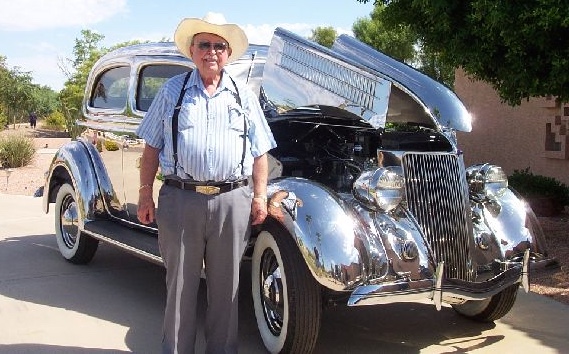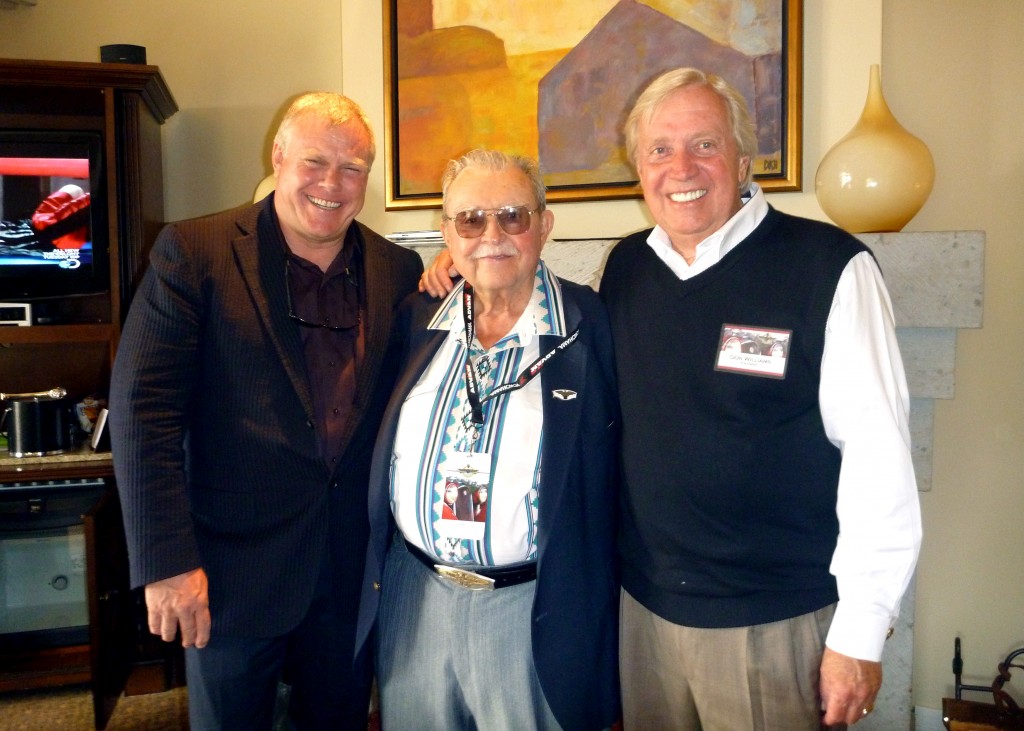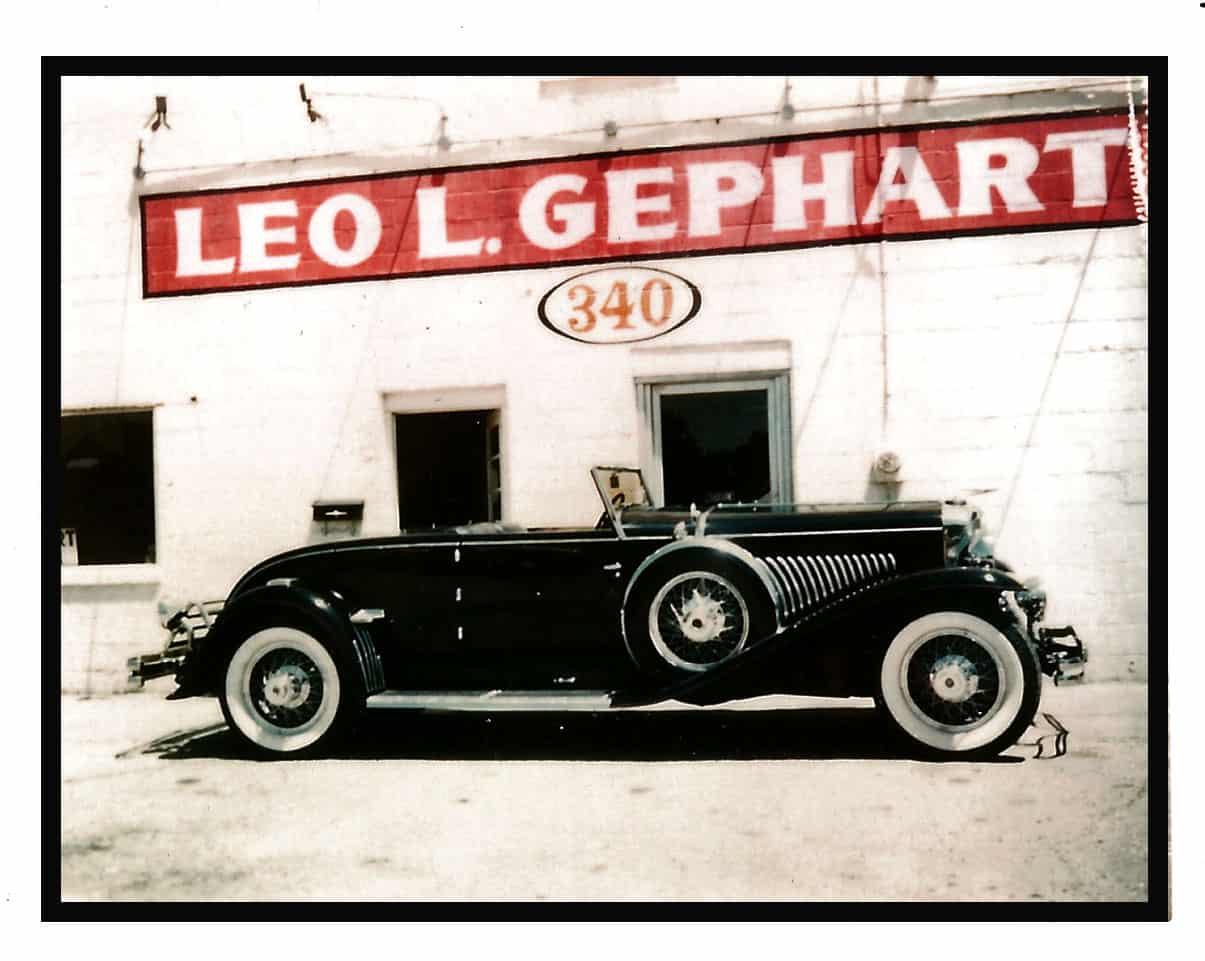
Hemmings Classic Car once referred to Leo Gephart, who died this past week in Arizona at age 85, as “a Magellan of the collector-car world… the first automobile retailer in the United States to focus on old cars as collectibles” and “a pioneer in appraising antique automobiles for their collector-car market value.”
“He’s basically the one who taught us all,” said Don Williams, owner of the acclaimed Blackhawk Collection. “He was one of my early mentors, and he was a mentor to a lot of people. He shared a lot.
“He stayed true to the hobby, true to his passion his whole life. I was very lucky to have known him.”
And then there was this statement on the Barrett-Jackson website: “If it weren’t for Gephart, in fact, Barrett-Jackson Auction Company might not be heading into its 45th year in 2016.”
“Leo Gephart, my father Russ Jackson and Tom Barrett worked together to develop the blueprint for the collector car auction as we know it today,” said Craig Jackson, chairman and chief executive of the company that carries his family’s name. “I grew up with Leo. He was an innovator and a visionary whose legacy will remain for years to come. He will be missed.”
He already is.

“Leo represented everything in a very proper manner in the early ‘60s and ‘70s when there were a lot of wild things going on,” said well-known car collector Joe Bortz.
“In the late-’70s and ’80s there were three kings in the business, three men selling the best classic cars and they had the best reputations,” Bortz continued. “One was Bob Adams in Wisconsin and one was ‘Tiny’ Gould on the East Coast, and then there was Leo Gephart in Arizona, and he (also) helped start the Barrett-Jackson auction.
“He’s the last of the kings of the old school, the three kings,” Bortz said.
“Leo was a true gentlemen and he was always helpful,” Bortz added, explaining that it was not unusual for Gephart to be selfless when someone approached him for advice about buying or selling a particular car, putting honesty ahead of possible personal profit.
“He was held in high esteem by everyone in the business. He was a pillar of the hobby.”
Some even considered Leo Gephart the “godfather” of the entire hobby.
“I think the one thing that everybody forgets is he was, call it genius or lucky or whatever you want, he was the guy who had came up with the idea of having a public auction for consignment cars at Auburn, Indiana,” WIlliams said. “He brought Tom (Barrett) and Dean (Kruse) together for the first auction. He worked the first auction.”
Gephart grew up in rural Ohio, working on the family farm. His father also was a tractor dealer. Even in high school, Leo would buy old cars, repair and sell them. After school, he enlisted in the Air Force and was a radioman on cargo planes flying from Texas to Greenland.
After his service, Gephart became one of the first members of the Classic Car Club of America and obtained his Ohio car dealer’s license and opened a Studebaker store. He was offered a Mercedes-Benz franchise but turned it down because, as he told me in an interview in 2012, he realized he preferred old cars to new ones, and thus he became one of the country’s first dealers specializing in classic vehicles.
Duesenbergs would become his particular specialty. During his life he owned 80 0f them, he said, some of which he bought and sold multiple times. He paid only $1,000 for his first one, a Willoughby-bodied Duesenberg limousine he bought in Pennsylvania. He drove the car back to Ohio, and soon sold it for $1,200.
That was a nice profit, Gephart thought at the time. But as he told me in 2012, “I had a feeling” that someday Duesenbergs would be worth a lot more, perhaps someday even selling for a million dollars. Indeed, Duesenberg Model Js often trade hands for seven figures these days.

“I had three or four that if I’d kept them, I’d be a multi-millionaire,” Gephart said in 2012.
Oh, and that Duesie he bought for $1,000 and sold for $1,200. It’s now part of the permanent collection of the Smithsonian Institution.
Even well into his 80s, Gephart was doing deals on Duesenbergs. Three years ago, he returned to the Midwest to secure a 1930 Duesenberg boattail speedster for his friend Mel Martin to put in his car museum in Phoenix.
“He was the opposite of what you’d expect from a ‘used car’ salesman,” Martin, a long-time customer, said of Gephart. “He was so knowledgable, and honest. He’d tell you want a car was worth, and what it was going to cost you to fix it up after you bought it. And if he told you to stay away from a car, you didn’t buy it.”
Gephart reportedly was the first to make a donation — $1,000 — when the Auburn Cord Duesenberg Club launched its effort to turn the old ACD headquarters building into a museum. In 1971, he recruited Auburn, Indiana, farm-implement and heavy-equipment auctioneer Russell Kruse to help him stage a classic car auction to raise additional money for the museum project.
He also helped convince Barrett and Jackson, who had been staging an annual charity car show in Scottsdale, Arizona, to add an auction to their event.
Later, Gephart would launch his own auction company, Auctions America (now part of the RM Sotheby’s operation). Seeing a need for people to get their purchases home from auction, he also started what may have been the first company — Frosty’s Delivery Service —to transport cars from auctions (he sold that company to Robert Pass and it became Passport Transport, which subsequently became part of FedEx).
With his wife suffering from arthritis, Gephart moved his business from Ohio to Scottsdale, Arizona, in 1980.
“Everything was a handshake and everyone was honest,” Gephart recalled in our 2012 interview about the pioneer era of classic car sales and auctions.
“Cars are interesting,” he added, “but it’s the people and the things they’ve done that are fun.”
Williams, who has had a prominent lifelong career in the collector-car hobby, said that the importance of Gephart’s willingness to share his vast trove of information and insight can not be overstated.
“He was a great sharer, like most of the original pioneers, as I call them, in the hobby,” Williams said. “He could talk longer and harder than any human being I’ve ever met in my life, always about car stories.
“I wish we would do more sharing now so that the young could understand what we see in the cars we love. My tastes have changed over the years, but I’ll never forget the great ones that he taught me.”
(Associate editor Bob Golfen contributed to this report.)






Leo Gephart was not only a walking encyclopedia of collector cars and automotive history, he lived it and contributed to it.
Leo once told me that he had owned over 90 Duisenberg’s through the years earning him the nickname “Mr. Duesenberg”, he even donated the first $1,000 to start the now world-famous Auburn-Cord-Duesenberg Museum in Auburn IN.
Leo was also one of the founders in 2010 of the GRG Scottsdale International Auto Museum (GRG = Gephart, Ranger, Gartley) and our Senior Curator, I was honored to be his Assistant Curator. RIP Leo.
FYI, I am helping to organize a memorial service for Leo with several of his former employees to be held at the Martin Auto Museum in Phoenix AZ at a date to be determined shortly.
Anyone interested in attending or who would like to submit their “Leo Story” to be read at this celebration of his life please contact me Bill Gilmore at AzCarCrazy at aol.com.